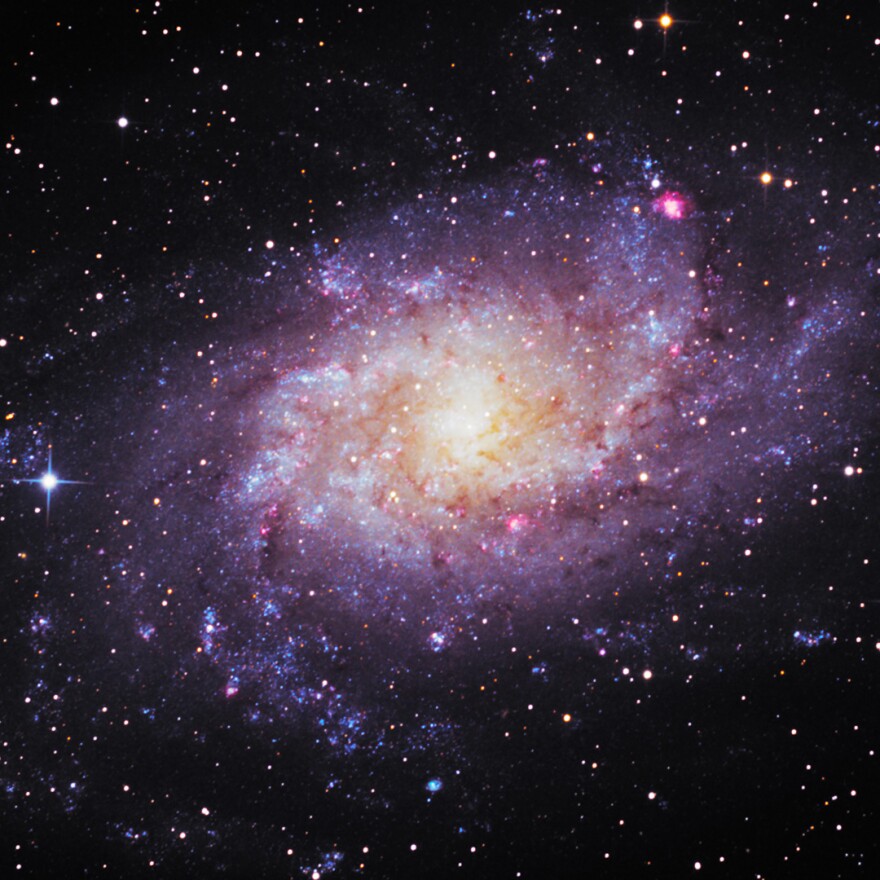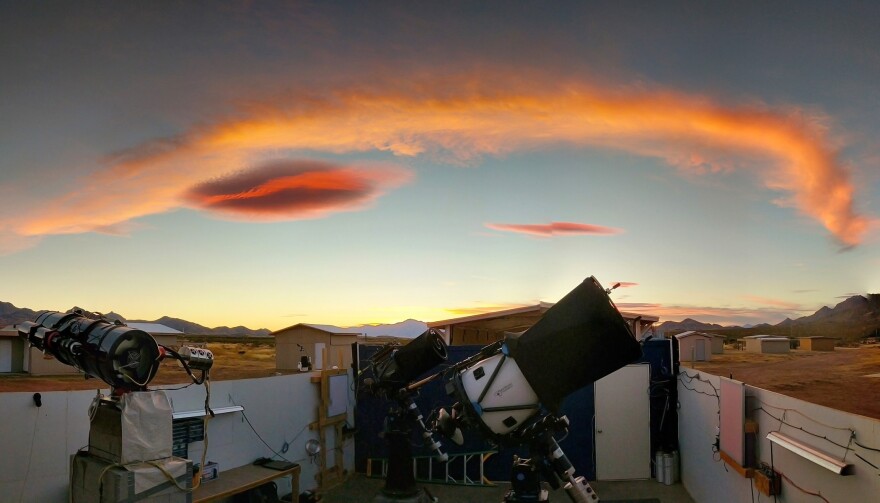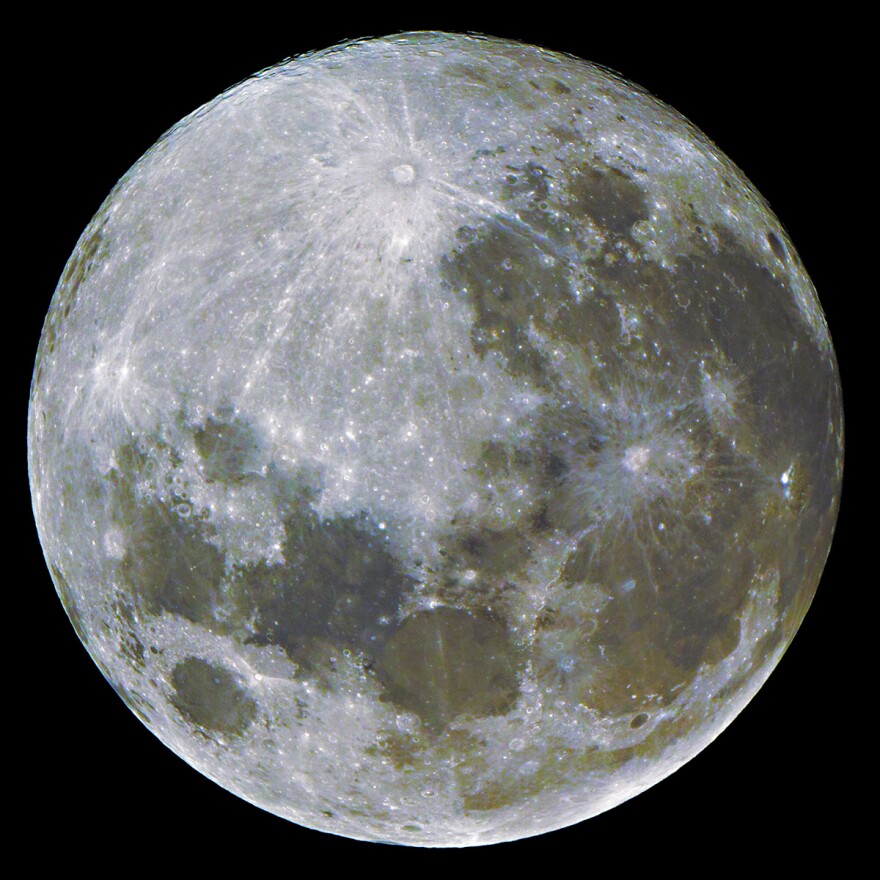The seasons are changing. The moon is telling us it's time to harvest the crops, and fall officially begins on Wednesday, September 22nd. Also, the annual "Astronomy at the Beach" event is coming up later this week, still virtual due to the pandemic.
WEMU's Lisa Barry talks with local amateur astronomer Dr. Brian Ottum about what to expect from all of the sky watching events now taking place.
TRANSCRIPTION:
Lisa Barry: The seasons are changing, the moon is telling us it's time to harvest our crops, and fall officially begins on Wednesday. This is Lisa Barry, and with his eyes on the sky all times of year and through all the seasons, we're checking in with local Saline amateur astronomer Brian Ottum. Thanks for talking to us, Brian.

Dr. Brian Ottum: It's great to be here.
Lisa Barry: We're talking about the harvest full moon, which will be visible pretty much all week.
Dr. Brian Ottum: Well, the full moon is this week, and it's going to be wonderful because it's visible all week, because it only comes up a little later each night. So, it's been very helpful for farmers and getting those crops in from the fields. So, they call it the harvest moon because it's this time of year, the harvest season. But it comes up only a little bit later each night, illuminating those fields, so the farmers can get the crops in.
Lisa Barry: Well, weather's been a bit tricky, but you're thinking by Thursday we'll have another good view?
Dr. Brian Ottum: Yeah, it looks like the Tuesday and Wednesday are kind of iffy, but I think that, on Thursday night, it looks like our best chance to see that really amazing harvest Moon coming up in the east. It comes up at about nine or two, and it looks like it'll be clear.
Lisa Barry: We have so many different moon names, depending on the time of the year, and the harvest moon, for me personally, I just feel the season change. Maybe it's because the temperature is changing as well. But how significant in the feeling of seasons does the harvest moon seem to you?
Dr. Brian Ottum: It definitely is a harbinger of the cooler weather. Usually, it's coming if it's clear and the moon's coming up. The temperature is dropping from a warm day to a very chilly night. And maybe that first frost is not far away. And so, that's what you think about when you see that harvest moon coming up in the east. And it's just always a really crisp evening.
Lisa Barry: And fall officially begins on Wednesday, speaking of crisp evenings.
Dr. Brian Ottum: Yes. Yes. And it's also happening this week, which is kind of great to have the two-in-one week. We got the harvest moon, and we got the autumnal equinox, which is the beginning of fall--the official beginning of fall. And what's interesting about that is the sun is setting directly west, and the sun is coming up directly in the east. So, no matter where you live on the whole globe, that's true. And that's only true at this time of year. And then opposite of this is the the spring equinox. And also, you know, we can talk about the physics of it. It's when we cross the plane of our solar system, and we're just lined up very carefully with the sun.
Lisa Barry: And something that we look forward to every year is coming up this weekend. Tell us about that.

Dr. Brian Ottum: Well, Astronomy at the Beach is in its 25th year.
Lisa Barry: Wow.
Dr. Brian Ottum: And it's very exciting. This is an event where us fanatic amateur astronomers love to get our telescopes out and share our passion for the sky with the public. And over these 25 years, we've shown probably 75,000 people views of the sky. Two years ago, we had 70 telescopes out there. And so, it's a wonderful event, but, because of COVID, we're not able to do it in person. We still want to be safe. So, this year, we've switched it to a virtual star party event, meaning people for free can go log on, and they can get live views like of the sun and prominences and solar flares, if it's clear. And then, in the evening, real telescope views. And, myself. I'll be using my remote control telescope that's located in the desert to show things. I'm rounding out the end of the schedule. I don't start until 10:00 PM.
Lisa Barry: What things will you be showing?
Dr. Brian Ottum: Oh, what I'm going to be showing is the tour of the universe. We're going to start with stuff that's close by. We might chase a satellite across the sky. I chased the space station last week and got a video of that. And then, we'll move further out and maybe peek at the moon and then the planets and show the rings of Saturn and moons of Jupiter and then move out to the nearest stars, some star clusters, and then watch a star being born and also watch a star dying. And then, the end is far, far away. Other galaxies and show pictures of, like, Andromeda Galaxy. That's always a winner.
Lisa Barry: How often are stars born and die?
Dr. Brian Ottum: In just our galaxy, it's happening right now. Millions of places.
Lisa Barry: And how do you recognize it?

Dr. Brian Ottum: Well, stars are born out of clouds of gas. And these clouds of gas usually glow. And, to the camera, they glow red. And so, they're rather easy to take a picture of, and that's what I do. Take a quick snapshot, and then show everybody and then kind of narrate what it is. So, yeah, these are clouds of red gas--nebulas. It's where stars are born, and they're all over the sky in pockets. And so, we find these pockets, and we take a picture of them.
Lisa Barry: I'm sparing you my Barbra Streisand joke. If you're a movie watcher, a star is born. Anyway, Astronomy at the Beach is taking place when again?
Dr. Brian Ottum: Yes, I didn't even say. I'm sorry. It's this Friday and Saturday, the 24th and 25th. And our schedule is three p.m. to midnight. Both nights.
Lisa Barry: Both nights. And we'll put links to how people can see that with this interview on our website, WEMU dot org. Brian Ottum. Always a pleasure to talk to you. Thanks so much.
Dr. Brian Ottum: Glad to be your guest. And it's always fun.

Non-commercial, fact based reporting is made possible by your financial support. Make your donation to WEMU today to keep your community NPR station thriving.
Like 89.1 WEMU on Facebook and follow us on Twitter
— Lisa Barry is the host of All Things Considered on WEMU. You can contact Lisa at 734.487.3363, on Twitter @LisaWEMU, or email her at lbarryma@emich.edu






